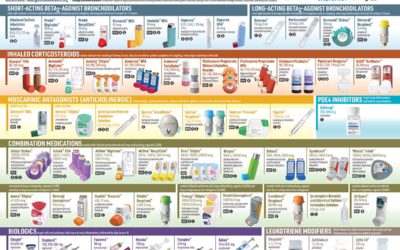Asthma patients who use one of Teva’s three Digihaler devices should talk wit their doctor about alternatives.
Asthma
Drug Companies Step Forward with Voluntary Price Caps on Inhalers
The price cap will help reduce the financial burden for many people who use respiratory inhalers to treat asthma and COPD.
New Asthma Inhaler Combines Quick-Relief Albuterol and Corticosteroid
A new medication supports treating asthma symptoms and inflamed airways in the short and long term using one inhaler device.
Is There a Link Between Migraine Headaches, Asthma, and Allergies?
Migraine is a very common neurological disease. It affects one billion people in the world. Recent...
Respiratory Inhalers at a Glance and Other Posters in Our Online Store
Learn about some of the most popular items in our Online Shop including inhaler posters, and other asthma, allergy, and anaphylaxis posters.
Losing Weight with Asthma
Many people struggle with their weight. And many people have a hard time losing weight. The U.S....
Breathing Exercises for Asthma
Many people with asthma find breathing exercises to be helpful. Breathing exercises can improve...
Navigating the Holidays with Asthma and Allergies
What you need to know about COVID-19 risk, asthma and allergies if you host or visit relatives during the holidays.
Family Asthma Act Reintroduced in Congress
The Family Asthma Act, named after the late Congressman from Baltimore, would strength the nation’s public health response to asthma.
Virtual Asthma Coaching Found to Improve Asthma Control
Allergy & Asthma Network’s virtual asthma coaching program is part of Trusted Messengers, a vital health equity initiative.
RSV Vaccines Are Now Available
The FDA has approved respiratory syncytial virus (RSV) vaccines for older adults and an RSV monoclonal antibody for infants and young children.
Back to School with Allergies and Asthma
Prepare for a safe and healthy school year with Allergy & Asthma Network’s school planning resources, available on our website.
All About
Asthma is a condition that affects about 25 million Americans, including 7.7% of adults and 8.5% of children. Asthma used to carry a stigma about how active someone with the condition could be, but people with asthma can live an active life as long as they are aware of their symptoms and environmental triggers, and know how to manage their medications.
Pollen, mold, air pollution, pet dander and indoor pests such as dust mites are common symptom triggers for asthma. Severe weather emergencies impact people with asthma as they need to consider their medication in case of evacuation. Environmental disasters such as wildfires can wreak havoc on asthma since smoke particles cause air quality to worsen. People with asthma should monitor air quality and be sure to include stress management, healthy diet and exercise in their daily lives.
People with asthma can control their symptoms and keep themselves safe by following their Asthma Action Plan created in partnership with their doctor. Quick-relief asthma inhalers can help relieve symptoms that occur at any time, while maintenance medications control symptoms daily. Biologic medications are increasingly used to address severe asthma. Getting the flu shot every year and practicing good hygiene, especially when around large groups during cold and flu season, is always a good idea. Eating healthy and getting moderate exercise, as well as practicing stress-relieving activities like yoga and meditation, can also help protect people with asthma. Keeping an emergency kit that includes extra asthma medication and devices, copies of medical records and prescription refill information, respirator masks, a list of contacts and a medication plan in preparation for speaking with doctors or other healthcare providers is also useful.
Allergy & Asthma Network hosts the USAsthma Summit every year to raise understanding about the chronic condition among community health workers and representatives from asthma programs from all over the country. They discuss strategies, guidelines and programs for asthma management as well as the latest clinical lessons and practices.












